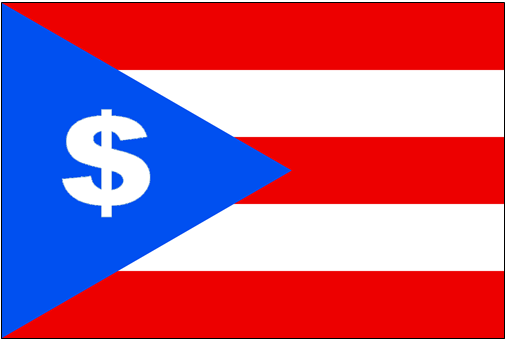“We are going to work something out. We have to look at their whole debt structure. They owe a lot of money to your friends on Wall Street. We’re going to have to wipe that out. That’s going to have to be — you know, you can say goodbye to that. I don’t know if it’s Goldman Sachs, but whoever it is, you can wave good-bye to that.”
That was President Donald Trump in an interview with Fox News, noting the obvious. Puerto Rico has been devastated by Hurricane Maria, and it is going to be extremely difficult for the U.S. territory to get on its feet financially to service its $72 billion of debt obligations.
While a full default remains unlikely, as for the debt restructuring, that is already provided for under PROMESA, legislation passed by Congress last year. Under the law, restructuring becomes mandatory when there are no other funds available to pay debts, and when no other voluntary arrangement can be reached.
Meaning, the harder hit the local government is by Maria, the more likely it is to turn to federal control board for more debt restructuring if a deal cannot be reached with creditors. This means that bondholders would not get 100 pennies on the dollar for repayment on the bonds, a so-called “haircut.”
Additional provision was explicitly put in place last year in the legislation to prevent U.S. taxpayers from having to foot the bill for bondholders who bet poorly on Puerto Rican debt.
With the President’s comments — although they change nothing materially about the law, which already provided for restructuring — once again there will be pressure brought on behalf of the bondholders for the U.S. government to bail them out.
Since Trump spoke, the price of Puerto Rico general obligation bonds immediately dropped substantially to about 32 cents on the dollar on secondary markets. But that might be an over-correction.
Under the restructuring already underway, for example on $5 billion of Government Development Bank’s debt, when Puerto Rico submitted its plan which needs to go to federal court, losses were said to be as high as 45 percent (meaning a bondholder with that deal would only get 55 cents on the dollar). That plan still needs to be approved by creditors and then a federal court.
Now, those are not the general obligation bonds, but if that’s how the process plays out under PROMESA, ironically, Trump’s statement might have inadvertently created a buying opportunity for investors willing to bet the restructuring process won’t be as bad as many are anticipating. A risky trade, for sure, but some will take it. After all, for everyone selling at 32 cents, somebody is buying.
This is where Congress needs to stick to the framework it set forth in PROMESA. Which should be fairly easy. To prevent taxpayers from getting on the hook to bail out creditors, since PROMESA is already law, all Congress has to do is nothing. The restructuring process is now finally getting under way. They need to let it work.
Maria ironically might help facilitate the process for creditors worried they might not get anything if they wait too long. It gives Puerto Rico leverage.
The President clearly is not optimistic that creditors will be fully repaid, but this is not new. Here, Trump was merely reminding the people of Puerto Rico that they can rest assured that immediately resources will be going to recovery, not creditors. Puerto Rico was in financial dire straits long before Maria hit. That was why Congress acted deliberately to provide for restructuring in the first place.
Instead, Congress should continue to focus its resources on recovery for Houston, southern Florida, Puerto Rico and other stricken areas. That’s something Congress has a direct role in appropriating funds. They’re the people who really need help, not the banks.
Robert Romano is the Vice President of Public Policy at Americans for Limited Government.








